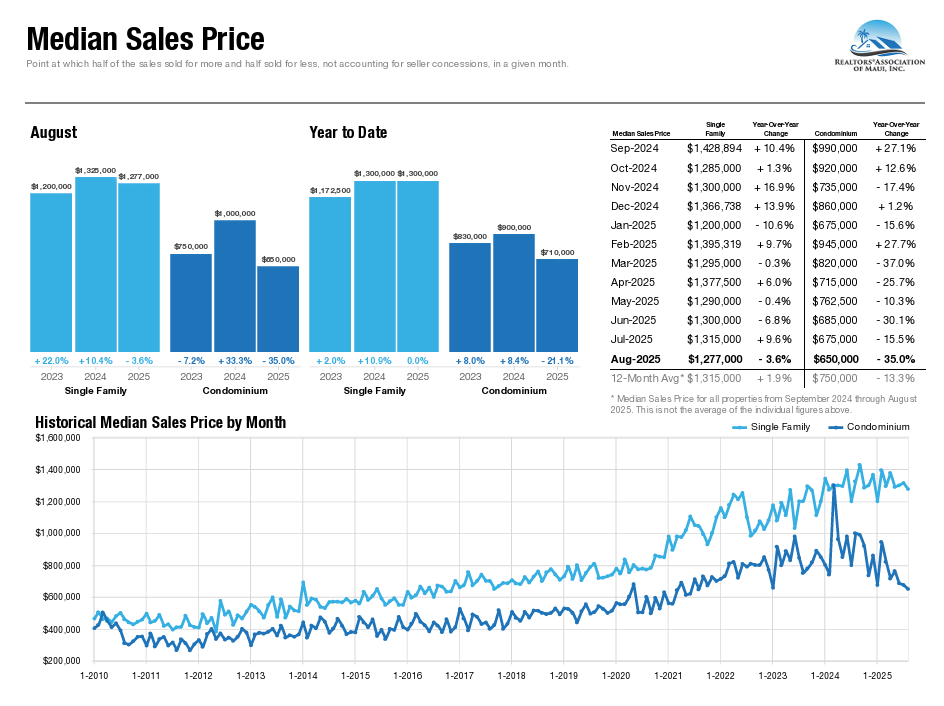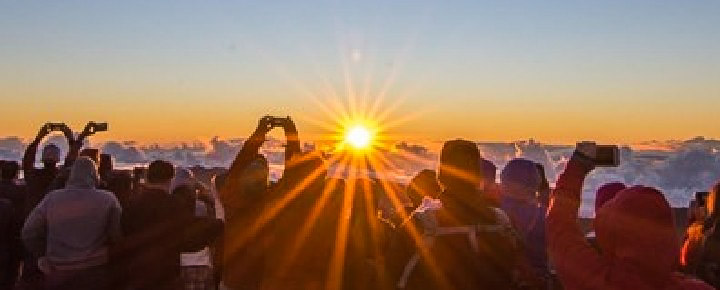Maui’s condo market just nosedived, with average sales prices plunging 44% in a single year. But this is not only a real estate story. It is a warning sign for travelers, as the future of vacation rentals on the island becomes increasingly uncertain.
What is behind the condo market collapse?
According to the Realtors Association of Maui, the median condo price fell 35% compared with the same period last year, dropping to $650,000 from $1 million. The average sales price fell even further, down 44% to $1.14 million. Inventory has surged to a 15-month supply, a level not seen in more than a decade. The number of sales is down 26% year-to-date.
On the surface, these numbers might suggest an opportunity for buyers. In reality, they reveal a market paralyzed by doubt. Sellers are reluctant to list, owners are unsure whether their condos will remain legal as rentals, and travelers are increasingly unwilling to commit to bookings. The steep drop in both median and average prices is a clear indication of how unsettled the market has become.


Nothing will change for visitors overnight.
Even under the current proposal, the phase-out of thousands of transient vacation rentals is designed to unfold over the upcoming years, and some observers say it could stretch to five years or longer once the inevitable legal challenges are factored in. For visitors, this means the accommodations landscape may appear unchanged in the short term, but the uncertainty is already clearly shaping the decisions made today.
How visitors are affected.
For decades, Maui’s condo market has been the backbone of family vacations and repeat visits. Condos offered space for groups, kitchens for extended stays, and prices that made Hawaii accessible to middle-income travelers. With condo values collapsing and regulations tightening, that model is under threat.
This shift mirrors what we observed in our earlier report, “Maui Visitors Are Quietly Saying It: We’re Not Coming Back,” which generated nearly 700 reader responses. While the reasons varied, the themes were consistent. Visitors are weary of nonstop cost increases layered on top of resort fees, parking charges, and new taxes. Many now hesitate to book rentals they fear may not be available by the time their vacation arrives, even if that concern proves entirely unfounded. For some, the uncertainty itself, combined with the ongoing controversy, has become a tipping point.
The steep drop in condo values is a direct reflection of that hesitation. It is not only buyers who are holding back. Visitors are, too.
Hotels may dominate Maui’s future.
If Maui proceeds with phasing out nearly 7,000 transient vacation rentals, the balance of visitor lodging will tilt sharply toward hotels and resort-zoned condos. That would mean fewer affordable choices for families, less flexibility for groups, and heavier reliance on high-end resort properties concentrated in West and South Maui.
For travelers, the practical impact is already clear. Booking earlier is becoming important as resort supply remains limited. Higher rates are likely to be the outcome if competition dwindles. And the familiar home-away-from-home condo experience that once defined Maui vacations may soon be much more elusive.
A fragile visitor economy.
Single-family homes on Maui have held steady at around $1.3 million, but those properties have never been a significant part of the visitor lodging equation. What matters is the condo sector, and that is where the disruption sits.
Maui’s visitor economy is fragile. It is not only about fire recovery. It is about the layering of rising costs, regulatory uncertainty, and shifting sentiment that together create a new level of risk. The collapse in condo prices is not an isolated number. It is another warning sign that travelers are already rethinking their plans.
What travelers should do now.
For anyone planning a Maui trip in the coming years, resort-zoned properties and hotels remain the most straightforward choice, since they are not directly affected by the proposed phase-out. Thousands of Minatoya List condos are also expected to continue operating, even as legal battles play out. What matters most to visitors is understanding that the rules are still in flux and could take three to five years or longer to be fully resolved.
With that in mind, flexibility is key. Choosing accommodations with clear cancellation policies provides protection in case of any sudden changes. Booking ahead remains essential, as some owners may hesitate to list their units while the market sorts itself out. And while many travelers will continue to visit Maui, others may explore different islands or destinations until there is more clarity.
Looking ahead.
Maui’s condo market just sent a clear message. Uncertainty has consequences. The island’s visitors, once among the most loyal in the world, are rethinking their plans. Whether Maui can steady itself before those quiet goodbyes become permanent is now the island’s defining challenge.
How are these changes affecting your own Maui travel plans, and do you see yourself booking the island again or looking elsewhere?
Photo Credit: Beat of Hawaii at Kapalua, Maui.
Get Breaking Hawaii Travel News







Golf tournament cancelled and people worried about tourism revenue? What about the 7000 plus short term rental condos the mayor wants to take out of circulation. Don’t think that will affect tourism for the next 20 years Maui is failing
Hawaii voted for statehood because 75 years ago people realized it was in their best interest. Life is hard everywhere and if you think it’d be easier if the island was ruled by the Chinese or Japanese that’s unlikely. If you want to see what a free Hawaii looks like, with half the residents of Federal and State aid, move to Molokai. Homes are very cheap with that thriving economy.
Good news for locals for a last ditch chance to purchase something that may still be unaffordable. Hopefully it goes further down to make it even more affordable for the local people who work 2 jobs just to pay rent.
Being local I understand their plight to live in a illegally occupied state where renting or owning one home to survive is a daily struggle.
I think all these things are true but you are missing a huge piece of the equation which is the huge rise in the cost of insurance causing dramatic increases in HOA fees. Not just on Maui but everywhere in the US.
The MIA Maui Mayor, missing in action when Lahaina burnt down is now CIA Maui Mayor too. Condo crashing in-action means it is a twofer for him.
What a joke on Maui when they get sued and lose.
Yes, that third time is the un-lucky charm.
What collapse? Whether by accident or design, this is exactly what Maui wanted. Lower prices, empty condos, fewer visitors—the only thing missing are the lineups to buy or rent these housing bargains. Be careful what you wish for!
I hope the Big Island learns a lesson or capitalize on it and maybe even lift restrictions. I love Maui but I pray Big Island does not follow.
Decision makers are ruining a good thing by changing policy in regard to condo rentals. I’ve been going to Maui for the past 25 years..first 5 in a condo rental and now own a time interval. Maui has limited resources. The main resource is people and now they are stifling that. Oahu is too busy, Hawaii has limited visitor facilities, and and the two others are not as developed for vacationers. Maui is tranquil, friendly, (was) affordable. It offers good attractions, varied restaurants and wonderful beaches and climate. Now they have lost residents, workers and tourists. What out weighs this tremendous loss of people-their most valuable resource. Where are their values?
Even if the Minatoya list condos are phased out 3 to 5+ years from now, there will still be approximately 7,000 short term vacation rental condo units AND 7,000 hotel/resort units to choose from.
There are several other important factors pushing prices down on Maui condos. Exorbitant monthly HOA fees that continue to increase ($1,500 to $3,000 per month). Many condo buildings are also aging structures with deferred maintenance issues. Many HOAs are under-insured for repairs and/or rebuilding after damage or total loss. Insurance premiums are increasing and some condos don’t qualify for flood/hurricane coverage or it’s extremely expensive. And many condo locations on or near the shoreline are high risk for coastal erosion, flooding, storm surge, etc. The condo market is self correcting because these are high risk investments with massive HOA and insurance expenses.
Okay, Mayor Bissen. Unfortunately everything you said is occurring on the other Hawaiian islands as well and the only difference is you’re Minatoya Bill. You’ve also done a terrible job with the economy and that isn’t helping. We’ll see you in court. Please keep saying things about how your policies are causing housing prices to fall. The lawyers are loving the hand delivered exhibits.
Teri. So if you just walked away from your financial requirements and contract responsibilies for thr timeshare, and after a notice of foreclosure was sent to you, did you not incur any negative actions from the Hilton corporation or Diamond resorts? Did it affect your credit score, etc?
Any suggestions on how to relinquish ownership of a timeshare. Impossible to sell. Although I love it there, I’ve had it since 1997. Fees climbing too high. Any help would be greatly appreciated
My parents just stopped paying on theirs, told them to keep it. They did that with one in Mexico too and nothing ever happened to them. They’re in their 70’s now, still plenty of money, just felt like Maui was no longer worth it as their week was up to $1500 annually with all the fees. You can also put yours up for sale for $1 on secondary sites.
We did the same with our time share at Kaanapali Beach Club. Had it under Diamond Resorts, which was bought out by Hilton. Annual fee went up to over $15,000! We stopped paying about 3+ years ago, & they finally sent a foreclosure letter in December, 2024. Didn’t bother answering any of their phone calls or letters, just walked away. We live on the Big Island & liked going to Maui for a few days every 2 or 3 months.
Not necessarily that easy. I have a client who just stopped paying the fees at his timeshares here in Maui and it sure went to the credit bureau which prevented him from buying the house of his dream. Granted, he is in his 50’s, not 70’s. He had to pay for an attorney and it took well over a year to get off the lien. I am sure it’s different if you own a time-share in Mexico.
We stopped paying our fees at Kaanapali Beach Club when Hilton took over from Diamond Resorts. Last year, we got a notice that unless we paid nearly $40,000 for two years of unpaid fees, they would reclaim our points. Tossed the letter, as we were rebuilding on the Big Island. No liens, no credit penalties, got our building loan from First Hawaiian Bank.
Sorry about your situation. I’ve heard several such stories. So many people fell into that trap. Timeshares are one of the biggest scams in the history of real estate. Overrated, expensive hotel room you pay upfront for years and even decades to come. I like to call them poor man’s condo that they can never own. Would be better off staying in a decent hotel or a rental condo. Tens of thousands paid upfront would’ve been better invested in stocks, ETFs or anything else other than a timeshare.
I agree. After listening to the timeshare presentations and considering condos that allowed short term rentals with a 30% management fee in addition to the condo fees, I bought a condo and rented it out long term before moving in a few years ago. It seems like timeshares work for very few people, although I have the impression they will make a come back with the ban of short term rental apartments.
Another clear case of you get what you vote for…good luck Maui residents, things are about to get much worse economcally for you.
Been coming to Maui for 42 years. Less affordable every year. Used to rent a condo and pay a flat fee. Now there is resort fee, which adds nothing I didn’t get anyway , parking which was free before. 2 Hawaii tourist taxes. Key fee of $75 ( for nothing) and you pay for a cleaning fee of upwards of $200 to get it ready for someone else. No thanks. I have many other places to see where I’m not getting robbed. ! Bye bye Maui
Please check back with us when you find comparable vacation resorts that still don’t charge resort fees, parking, taxes, cleaning fees, etc. We will all want to rush there, unless it is in a foreign or unsafe location.
Thanks!
Our hoa charges “resort fees” for each booking of $30. $200 is just what it cost to have a cleaner come in for about four hours to turn a unit. A $75 key fee is definitely a new one. Now the door locks on most units that can be programmed are $500-$1000, but beyond that it’s just a subscription fee to be able to remotely update them.
When I went to Lahaina for a week, work-related, the moment I stepped off the plane, it was like being in a Disneyland ride. White people having a Hawaiian Shirt Friday.
Driving to Hana a few days later, and despite beautiful greenery, it was the same impression. Everything geared towards accommodating the tourist.
I felt sad. I wondered how it must feel to Be Hawaiian and be surrounded with so much fakeness.
For many years, I lived in the Napa Valley, so I’m definitely familiar with tourism. When it takes over, a place begins to resemble a caricatured shell: a hollow echo of it origins that only springs to life to sell baubles to each new crowd vomited up by the next plane or cruise ship.
I hope Maui reclaims itself.
Reclaims what? Lahaina was a fishing village consisting of an economy selling sex and provisions to the whaling fleet for most of the 1800’s. The kingdom never gave the people land and sold it off entire islands. The history people hear about as about as make believe as the experience you said you had.
Study the real history of Hawaii and the truth as to why the govt. controls the people through govt. suppression of native lands.
I guess we can assume you never travel anywhere then, Lisa, as a tourist. I wouldn’t either, if I felt I was being “vomited out” of my means of transportation. But that is a particularly ugly description of people just traveling for vacations. Tourism is a wonderful thing, giving people opportunities to see different places and things all over the world. You make it sound like some kind of vice, which is unfortunate. And if you do it personally, “you’re the pot calling the kettle black”.
Tourism is not what you say. I’ve lived in three continents and I can assure you that the tourist experience is the exact opposite of “seeing” a place and learning about relevant “things” in the world. Tourists tend to go to locations that most residents of a place tend to avoid.
I currently live in Kyoto again these days and it always shocks me to see where western tourists go, what they buy, and what their priorities are. The exact opposite of where we locals go, I can assure you! Modern mass tourism will re-inforce your preexisting beliefs and very rarely give you true insights into a culture. Quite the opposite. Because of over tourism, most Kyoto natives will ignore tourists as much as possible these days.
When tourism begins to change the very nature of a destination, that’s when trouble starts. Just look at the enormous backlash going on right now across Europe, from Amsterdam to Zagreb and everywhere in between, Europeans are saying that their home is not a playground for folks with disposable income.
Over the years, Maui has lost its soul. Contorted by the relentless demand for sun, sand, and sea. AirBnb, VRBO, and other tech advances have turned Maui into a transient Disneyland. Some balance needs to be restored. Let me be clear, if you jumped on that bandwagon thinking you’d cash in by buying property and then putting it on the short term rental market, You are part of the problem.
IMUA!
Maui no ka oi.
Covid, hurricane induced wildfires and Bisson.
The death nails in the economy for Maui workers, grocery stores, taxes for infrastructure and restaurant employees/owners all suffer from each one of these tragedies.
Maui’s heyday Will no longer be as bright and shiny as it once was.
This whole thing is very sad. The last is funded and orchestrated by selfish individuals.
Well yeah, if I was thinking about buying a condo but learned I couldn’t rent it out to help with the mortgage, who in their right mind would buy it just to use a few weeks out of the year? Only the super wealthy could afford that and they wouldn’t be interested anyway. They’d rather just stay at a nice hotel than mid range condo and invest their money elsewhere..
The wealthy are fleeing too as the Mayor and Council almost doubled the second home tax rates last year. They also overstate property values by 15%-20% and challenging them is a waste of time because you come up against a bunch of unks who want you gone.
Jim,
I know of a condo on Maui where the HOA is over $4,800 per month! I stayed in it for 13 days from late August to early September.
Maui and the rest of the islands made it very clear…the only visitors they want are the high end, big money visitors.
They haven’t even been cryptic about it. they have literally said that they want to hotels full (at $1000/night), they don’t want guests to rent cars, as they prefer that they stay almost exclusively at the resort. No eating at Coconuts (would signal a low-brow traveler), no going on RTH (creates traffic), and certainly no beaches off the resort front (as we all know, “no one” owns the beach, unless you’re a local who demands they have exclusive rights to it).
I just returned from 13 days in Lahaina 5 days ago. I may go back, but only because I have a place to stay for free, if the airfare remains cheap like it was for this trip. Overall I wasn’t too too impressed, but had fun snorkeling. I drove around most days without any definite plans except for 1 boat tour that had to be scheduled. Everything is very expensive there. The grocery store prices shocked me! Gas was only slightly higher than Southern California gas though. If I had to pay for a condo/hotel, I wouldn’t go back.
I think the article exaggerates the impact of str’s being phased out. The fact is vacation rentals will always be there that have been zoned as rentals. The ones that are going away are the ones that were zoned for residential purposes being used as airbnbs. This is really good if the prices are indeed coming down because they were overpriced to begin with. My condo that is in a community that does not allow strs (thank goodness) has tripled in value since I’ve purchased it.. it’s ridiculously priced and I hope it will go down so others locally can actually afford to buy it. I believe str’s have done a lot of damage to the housing market and hopefully this will be a step in the right direction to bring down the prices.
you are uninformed, the STR’s they’re trying to phase out have always legally been legally able to operate as STR’s for the last 50 years.. none of them require STR permits, because a permit was never required in those zones. Maui County is attempting to change zoning, thats it.. And if you yourself want to create affordable housing.. you can sell your condo for what you paid for it or less… that’s how that works
The Minatoya condos allowed short term rentals. They were allowed for decades. This was not an under-the-table arrangement with owners and some rogue politicians. County council codified this right and granted the same lawful rental rights to Minatoya condos as were enshrined by zoning for the hotel-zoned condos. There was literally no legal distinction between A1/2 condos and H1/H2 for decades, and investments were made based on the guarantees outlined by the Code. H-zoned condos didn’t require owners to rent on a short term basis any more than A1/2 condos required owners to live in or rent them long term. Peddling misinformation is part of the problem with this fiasco.
100% the gov/mayor/council pedal misinformation, newscasters, believe the misinformation then the public who doesn’t research, or never owned a condo believe it.. just like someone here won’t pay $1500 for rent.. condo dues are $2000 a month..plus a loan payment taxes and insurance.. Nothing is Free.. but the gov here wants people to believe they’ll get a free condo.. won’t happen, unless the county buys it for them.
I’ve always loved Maui. But with the terrible fire and total destruction of Lahinna, it would be too painful to see. There also is the uncertainty of the market and the high cost of travel there. It also seems that there is a loss of the aloha spirit and the feeling of ohana. Only time will tell if Maui can overcome all there problems.